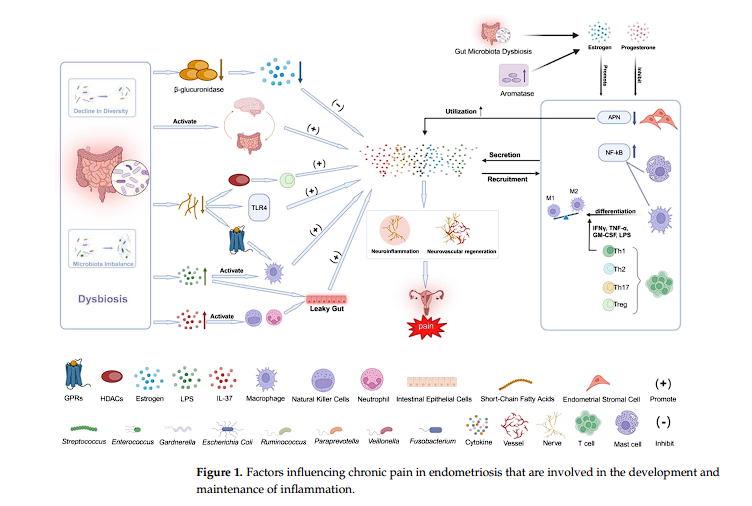Endometriosis and the Brain: Connecting the Dots Between Pelvic Pain, the Nervous System, and Cognition
Watch my YouTube video on this topic!
Two comprehensive reviews of scientific research published this year highlight the significant connections between endometriosis and neurological dysfunction. These findings reinforce the understanding that endometriosis is more than a pelvic condition, impacting neural pathways, cognitive function, immune cells, and more. Cumulatively, these insights point to promising opportunities for new therapeutic approaches to managing endometriosis.
The article “Cognitive Functioning in Females with Endometriosis-Associated Chronic Pelvic Pain: A Literature Review,” written by Ashlee Berryman and Liana Machado and published in Oxford Academic’s Archives of Clinical Neurophysiology on Jan. 18, reviews studies exploring the correlation between chronic pelvic pain and cognitive dysfunction.
Pictured: Ashlee Berryman
Sourced from: University of Otago
Ashlee Berryman is a PhD candidate and research assistant in the Department of Psychology at the University of Otago in Dunedin, New Zealand.
“Those living with chronic pain conditions, irrespective of it being isolated to the pelvis or not, generally report cognitive difficulties,” said Berryman. “It's all well and good for me to say that and know that anecdotally, but the review had to be conducted.”
Many endometriosis patients describe experiencing cognitive impairment, commonly referred to as “brain fog.” With symptoms so commonly reported, some may wonder why this research is even necessary. However, for scientists to continue to research endometriosis and develop more effective treatments, they must confirm basic truths about endometriosis through the scientific method, without relying on confirmation bias.
"We need to objectively measure those [cognitive] deficits before we can put any funding forward to be able to resolve the problem, even though it's clear the problem does exist,” said Berryman.
One of the main takeaways from the review is that much more research is needed to fully understand and effectively treat endometriosis. The authors emphasize the need to explore more factors that could affect these findings.
“I'm trying to tackle that in my lab,” said Berryman, alluding to her current research. “I can't talk too much at the moment about the results of my experimental chapter because it's in preparation to be published, but we have at least established that there are objective cognitive deficits between people who have endo with chronic pain and our healthy controls. The next step is to do a replication study before we can put forward intervention-based strategies to clinicians, at least in New Zealand.”
Another article, “Unveiling the Mechanisms of Pain in Endometriosis: Comprehensive Analysis of Inflammatory Sensitization and Therapeutic Potential” by Yixiao Chen and Tian Li was published to the International Journal of Molecular Sciences on Feb. 19. This review examines how various factors may lead to ongoing inflammation and nerve sensitivity in people with endometriosis, aiming to better understand what causes the pain and suggest new treatment possibilities.
Pictured: Renee Grandi
Sourced from: Women’s Integrative Health Clinic
Clinical naturopath, nutritionist, neuroscientist, and founder of the Womens’ Integrative Health Clinic in Australia, Renee Grandi, gave her thoughts on the article.
“It shows that endometriosis is absolutely multifaceted. There are so many variables that need to be taken into consideration when looking at women with endometriosis,” said Grandi. “We're looking at the genetic sequencing, the gut microbiome, the increased histamine, the estrogen to progesterone ratios, the neuro-inflammatory side of things, the neuroimmune interface from the peripheral to the central nervous system, and how that influences the pain signaling.”
The article further explores inflammation in endometriosis, and how it can lead to nociceptive sensitization, a process in which pain receptors, called nociceptors, become more sensitive to stimuli, leading to a lower threshold for pain and an increased pain response.
“When your body registers that there's inflammation, it's going to get sent through that spinal cord into the brain. A lot of the time though, the inflammation is so chronic, this is where that pain sensitization comes in. You have just got this excessive stimulation from everything happening and you have depleted the mechanisms that are going to shut it off,” said Grandi.
Fascinatingly, the review also shows that inflammatory cytokines (signaling molecules released by immune cells) can trigger inflammation in response to endometriosis and alter how cells communicate. These changes can affect gene expression and even alter DNA, particularly how anti-inflammatory genes are transcribed.
“Sometimes these can be thousands of genes, not just one or two. You can imagine the cascade that happens,” said Grandi. “It's going to create and exacerbate that pro-inflammatory environment, and then you're getting chronic, persistent inflammation. This is why you have to be looking at endometriosis as a neuroimmune hormonal complex multifaceted condition that is extremely intertwined with the central nervous system.”
The article ultimately concludes that pain in endometriosis arises from a combination of complex processes in the body, mostly related to long-term inflammation. Scientists have already identified several key parts involved. Continued research into these mechanisms, as well as more widespread application of the research, could lead to more accurate diagnoses, better treatments, and a broader understanding of what patients are experiencing.
The consensus among endometriosis sufferers and their advocates tends to be that not only the research is lacking, but also that the available research is not being applied to medicine in practice. Like fruit ripe for picking, advancements in science eagerly await the opportunity for implementation.
“I don't think conventional medicine is doing justice to this research at all… They don’t have the right protocol of therapeutics to navigate the complexity of endometriosis,” said Grandi. “I don't think it's fair that women just don't have answers. We are so notoriously dismissed and gaslit and rejected and manipulated, and it's just not right.”


